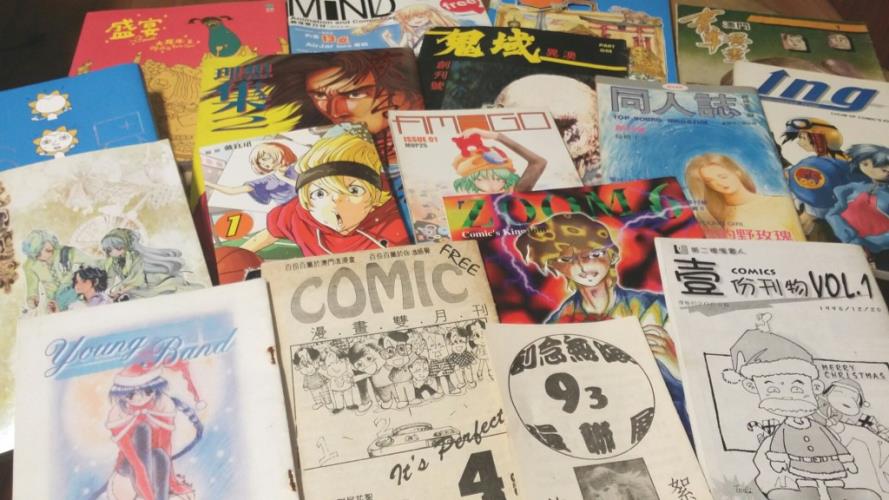An accountant by profession, Ashley is member of several anime and comics associations in Macao. She started writing fiction, illustrated and drew the comic strip of Macao Daily in the early 1990s. Later on she took the role of comics writer, and she is now the managing editor of MIND², a comics magazine published by Comic’s Kingdom. Ashley also participates in organising the Macao Animation, Comic and Toy Expo, an event run by Macao Animation & Comic Alliance.

Macao’s economy was growing fast in the 1980s and it was during this period of time Hong Kong and Japanese comics had quite an impact on Macao. Some comic fans started to form groups to write comics during their leisure times. They published their works and occasionally held exhibitions. At the beginning these activities were self-financed. Later, they were invited to contribute to the comic strips in newspaper and magazines. Comic fans didn’t have their own styles at the beginning. Their formats and styles shadowed those in Hong Kong and Japan. If you judge those works by today’s standard, you might find them laughable or cringe-making. In fact, it’s those substandard yet passionate works that lay the foundation of today’s comics and animation in Macao.
In early days comic fan groups were mostly underground. They became formal associations at a later stage, and now are mushrooming thanks to the relevant policies that foster the growth of the sector. It’s been 30 years. Looking back, how many of those comic fans are still creating comics? Some of them have been working hard and have become artists, but they no longer label themselves as comic artists. Some of them have their full-time jobs and occasionally draw a couple illustrations. Some have joined the creative industries and built their own brands. It is sad to know that many of them have already lost interest and passion towards comics. Comics only have a role to play in certain stages of their lives. Well, this is of course important, but it is over. There are people who have kept drawing comics since they were young and now they have reached their middle age. They have overcome ups and downs of the sector, successfully published their works and held relevant exhibitions. Their determination and steadfastness towards the comics and animation sector in Macao deserve our respect.
Today, comics and animation have become part of the creative industries. But they are actually different from other forms of arts, in respect of the themes of the work, contents, promotion channels and audiences. Just like texts, comics and animation are a vehicle for expression and can be enjoyed by scholars and lay-people alike. For instances, Tsai Chih-Chung’s comics on Chinese classics, and Japan’s long-running comic series with themes on certain professions or industries, are both entertaining and full of knowledge. In Macao, a number of comic artists have also worked on themes such as history, religion and world heritage. Recently, there is a boxing-themed comic with characters based on real people and actual events. However, in this commercial-driven society, the target market for most of the comics and animation is teenagers and therefore most of the products are for entertainment or sensory-provoking. The illustrations are eye-catching, but the content is weak and boring. Sometimes they are for readers with certain specific interest only. When comic lovers become more mature, they tend to read more and will find such comic books can’t meet their needs at all. Eventually they feel tired of reading them. For those who are still creating comics, they have been thinking and exploring how to build their own styles. They hope that they can create something not purely with commercial values. And the hurdles that amateur comic artists face in reality are actually secondary.
When we look into other forms of arts such as literature, dance, music, drama, opera and photography, they are huge subjects and their lovers can spend as much time as possible to delve into them. The contents of those forms of arts get richer and richer after years of hard work by their creators. Comics and animation are also a form of arts. But no matter how hard comic artists are working, it seems that they can’t really make it flourish. Although the sector has crossover ideas with other sectors, and there is a classic comic being adapted into a theatrical play, such collaboration is not something that an amateur artist is capable of doing it. Also, it has become another form of arts, and it’s no longer regarded as comics.
Of course, there are comic lovers at any eras, and the society has been evolving. With a strong commitment in the creative industries in recent years, Macao boasts much better education and economy than it used to be. This has encouraged young people to follow their dreams. New comic and animation groups are mushrooming in Macao. Independent comic artists are also emerging. They do not follow traditional rules and are more creating and daring.
I hope that the new comic artists can continue to follow their dreams and contribute to the comic and animation sector in Macao.